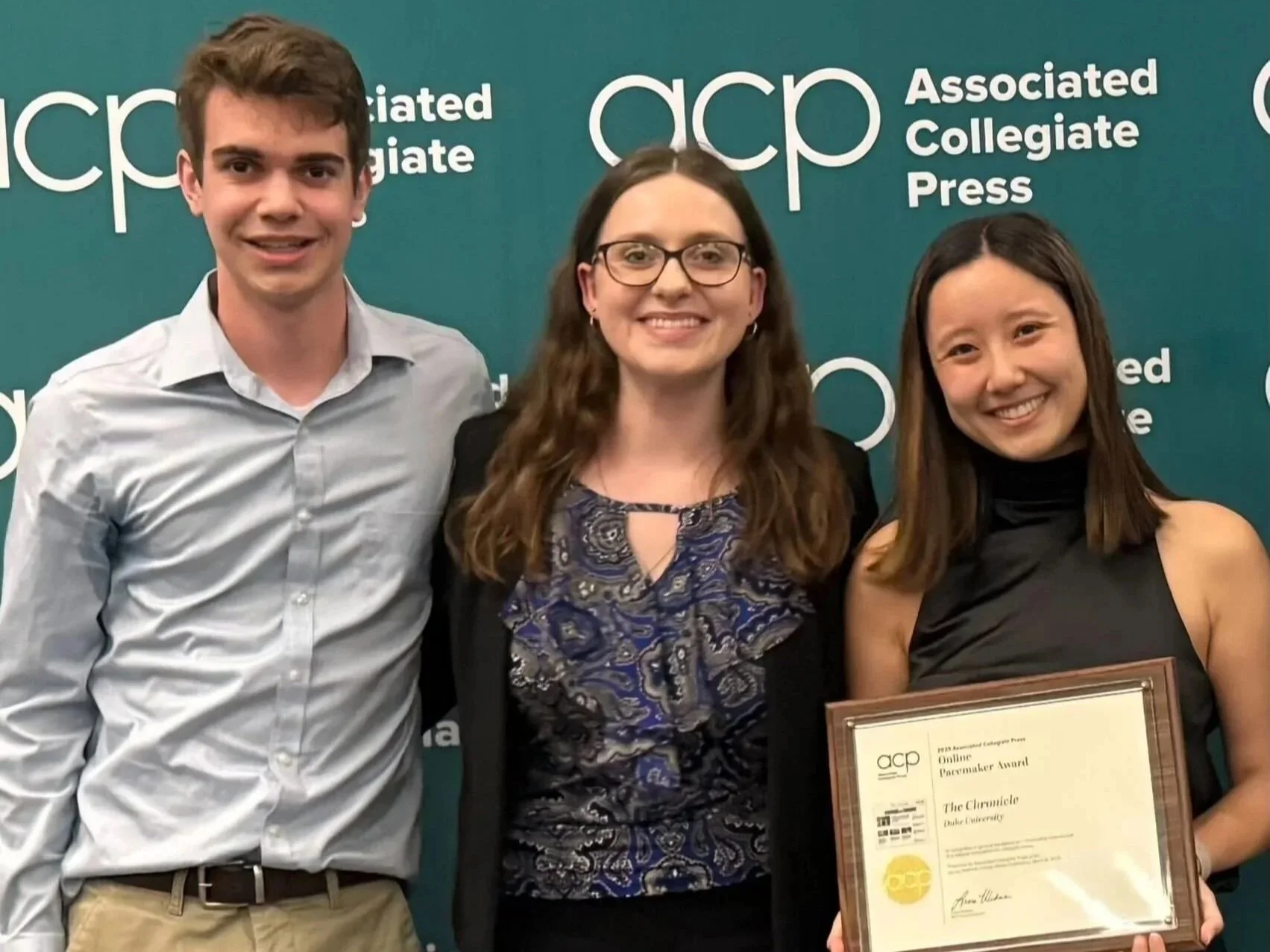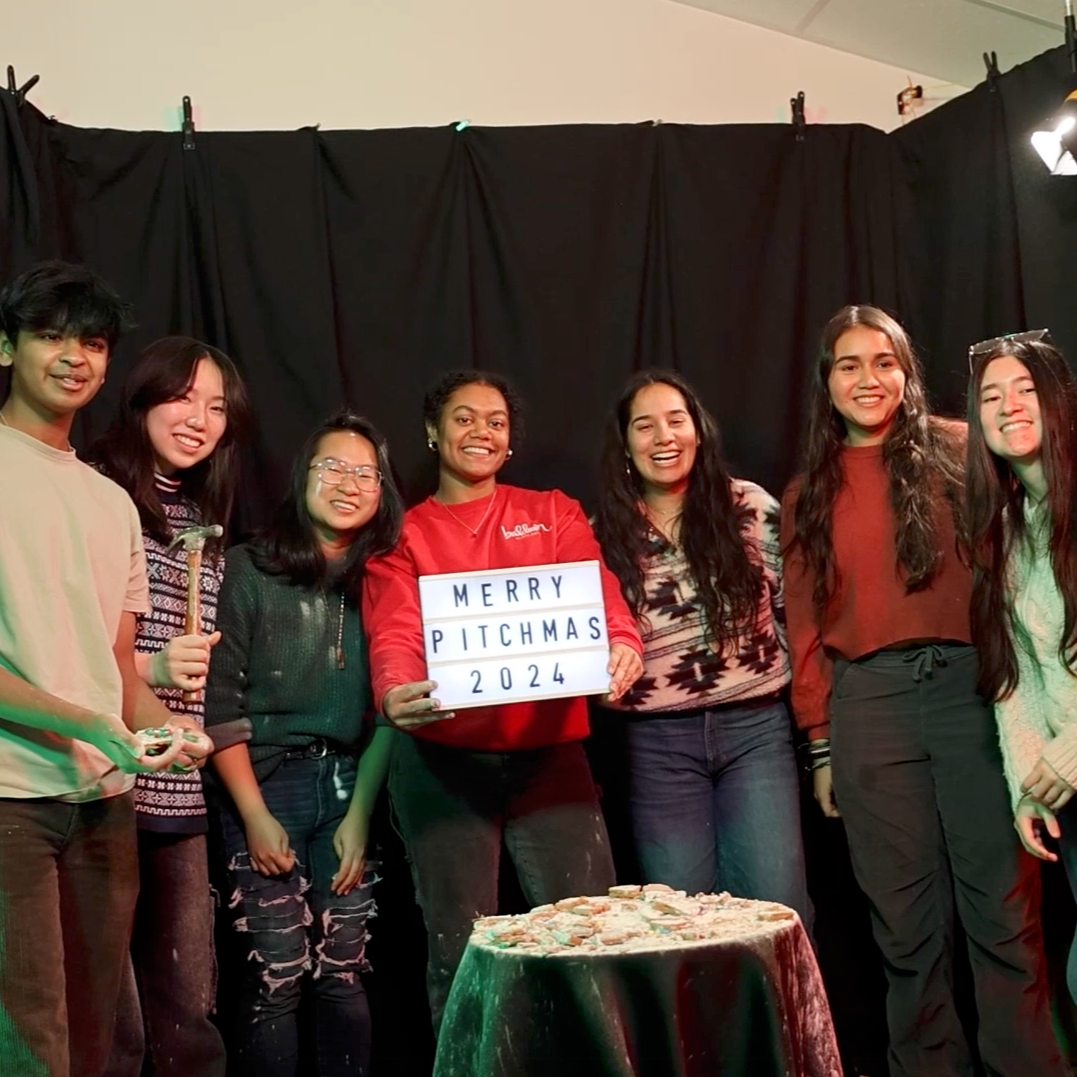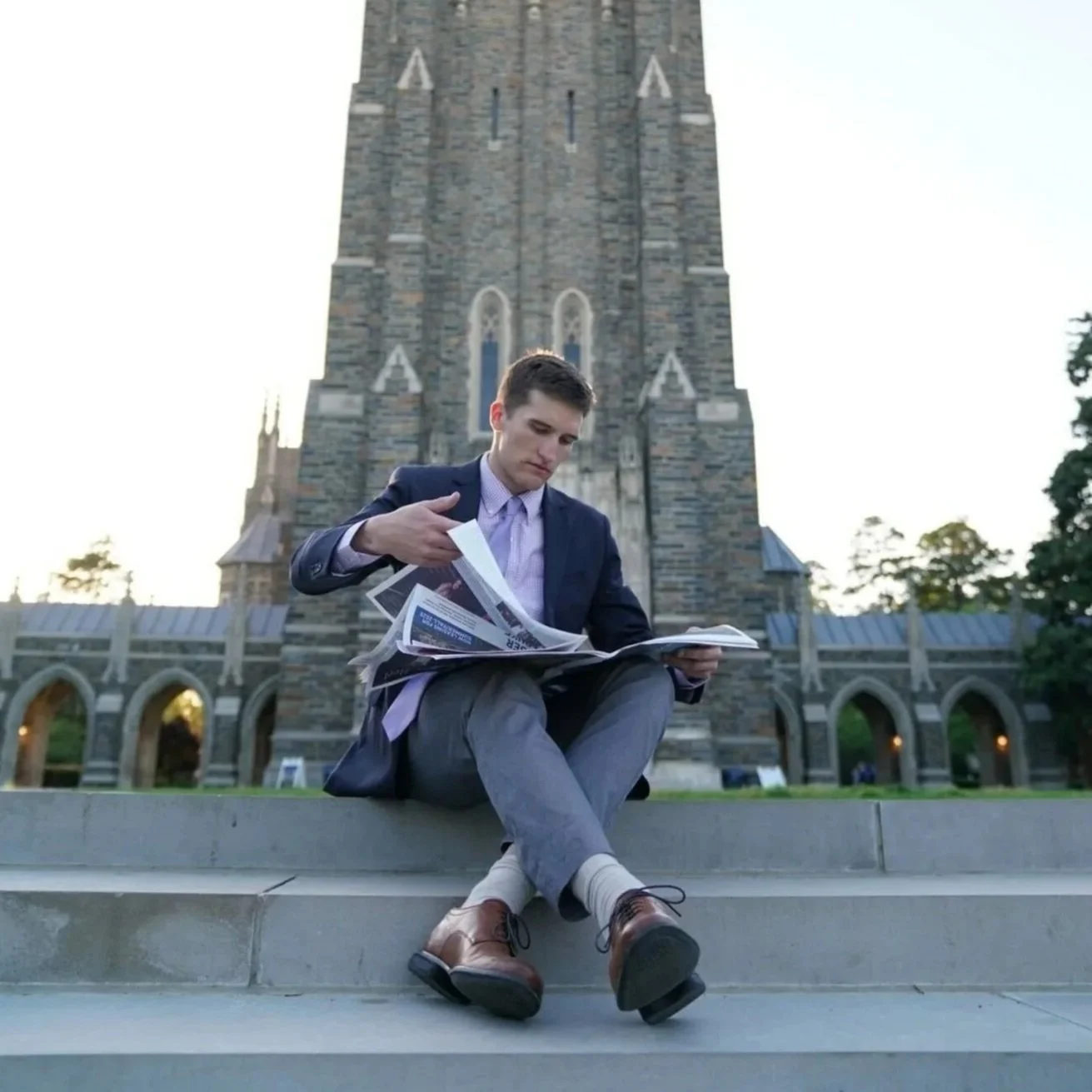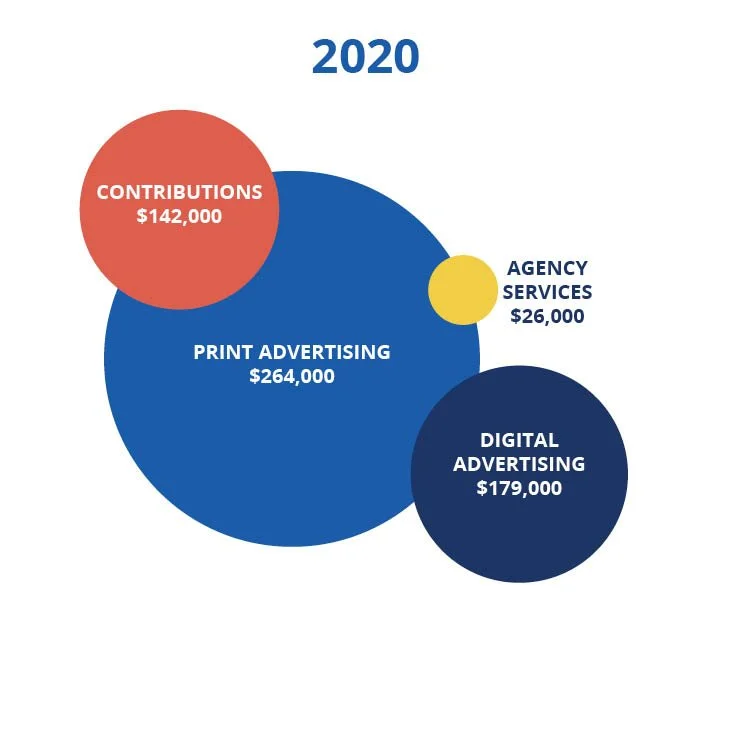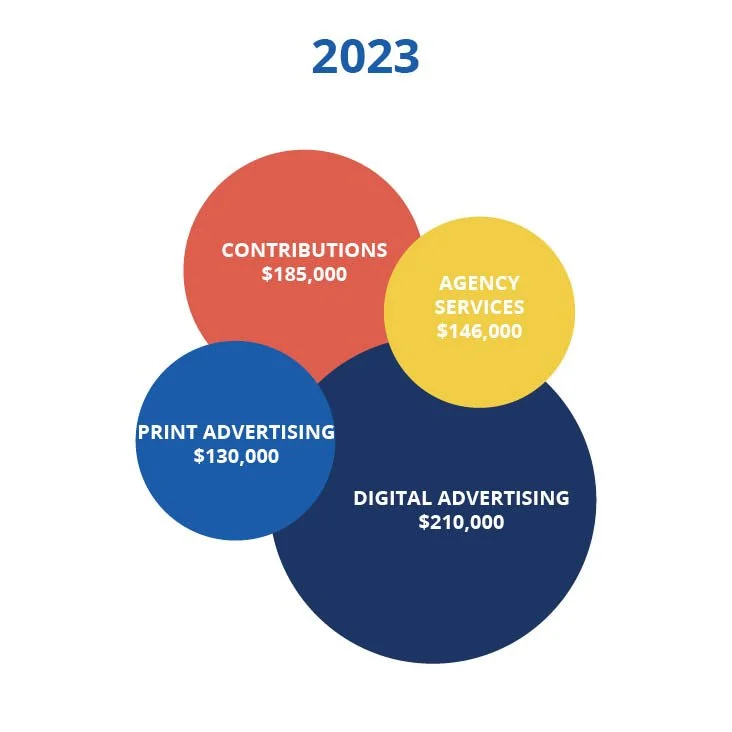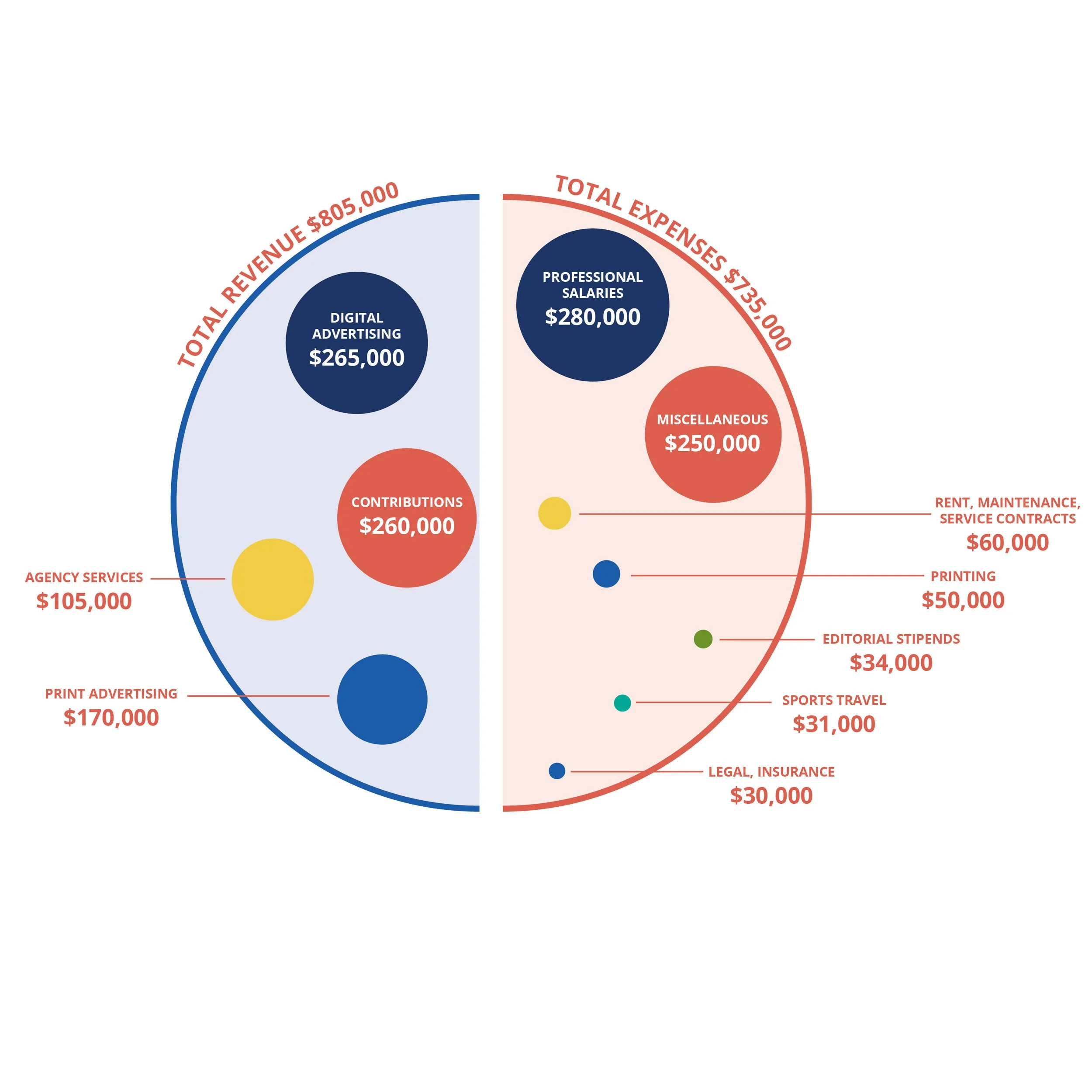The Chronicle’s Annual Impact Report
July 1, 2024 to June 30, 2025
Message from recent editor Abby Spiller
Friends of The Chronicle,
301 Flowers was lively throughout The Chronicle’s 120th volume.
The news department led several new projects, including our special Centennial and Elections series, while the sports department reported on a truly historic year across Duke Athletics and launched its new weekly newsletter, SportsWrap. Our opinion and photo sections brought these news stories to life, highlighting campus dialogue and impactfully visualizing our content. Certainly not least, Recess ramped up its reporting on the unique Duke and Durham arts scenes, ranging from student productions to city performances.
But Chronicle-large, we also made great strides. We premiered our weekly news video recap, “The Devil’s Digest,” while our business team launched Week Ahead, a newsletter highlighting events across campus. Notably, we also created an audience engagement team to help inform our coverage strategy, which helped us reach 10,000 followers on Instagram! And although we are now digital first, we released special nine print editions, including a 2024 election issue and a magazine celebrating Duke’s Centennial.
This all culminated in The Chronicle winning The Associated Collegiate Press’ coveted Pacemaker Award, which honors the top collegiate newspapers in the country. I could not have been more humbled to lead such a smart and driven newsroom dedicated to producing top-notch journalism.
This is just some of what our newsroom was able to accomplish this year, and that is thanks to you — our supporters and donors. As an independent student newspaper that does not accept student group funding, all of your generosity and support directly impacts the work we are able to accomplish each year. Our reporters are so grateful for your record-breaking contributions from this past year, and are eager to continue this work into our 121st volume.
Thank you!
Abby Spiller
Volume 120 Editor-in-Chief, The Chronicle
Michael Austin, Zoe Kolenovsky and Abby Spiller with the 2025 ACP Pacemaker Award
IMPACT by the Numbers
29,000
Daily Rundown email newsletter readers
155,000
X followers @DukeBasketball
425,000
dukechronicle.com monthly users
16
engaged board members helping us navigate big changes in our industry
8
print editions for special content
5 of last 6 years
winner of the Online Pacemaker Award, for one of the best student news websites in the country
12,500
Instagram Followers and growing!
5th year of the
Karen Blumenthal Internship
650+
alumni and friends who made a donation, attended an event or mentored our staff
4
alumni gatherings in NYC, DC and Durham
200+
students working on editorial staff: editors, reporters and photographers
20+
students on business staff: ad sales, ad agency and fundraising
competitive Chronicle funded internship experience @ Dallas Morning News in business journalism - Mackenzie Sheehy had a great summer on the business desk.
Chronicle Impact Stories
-
Determined by engaged minutes on dukechronicle.com:
Crystal Mangum admits to fabricating 2006 Duke lacrosse scandal accusations
Dom Fenoglio, Ranjan Jindal, Sophie Levenson and Abby Spiller
Sophie Levenson
‘The White Lotus’ Season 4 to be filmed at Washington Duke Inn
Monday Monday (Macey Davis)
Racism, fatphobia and child labor: Duke welcomes Lululemon with open arms
Felix Jones
Duke admits record-low 12.8% of Early Decision applicants to Class of 2029
Michael Austin and Zoe Kolenovsky
Abby Spiller
Ranjan Jindal
Air Jordan drops UNC, proposes sponsoring Duke after Saturday's showing
Monday Monday (Macey Davis)
Is it time to be concerned about the transfer portal's impact on Duke men's basketball?
Myles Powicki and Ryan Hamner
Sarah Diaz
-
Like many nonprofit media companies, The Chronicle relies on philanthropy as a critical part of our revenue model. We are incredibly grateful for another record-breaking year of generosity from all of you. Our financial independence from Duke is vital and you make it possible. Thank you.
One highlight was our victory this year in our annual fundraising Rivalry Challenge with The Daily Tar Heel, giving us the lead in our number of wins. This challenge has increasingly become the backbone of our revenue efforts and helps us continue to cover the increasings costs of sending our sports staff to most away football and basketball games so The Chronicle can bring our readers the coverage they have come to expect.
And The Challenge brings us together as Chrissy Murray, The Chronicle’s CEO, notes:“The Rivalry Challenge remains the one thing we truly all do as a team – student staff, alumni, DSPC Board of Directors, full-time staff – and it is the most gratifying, beneficial project we can all rally behind.”
Philanthropic gifts powered much of our work last year, including
Specialized training in audience engagement.
Travel to Long Beach, California to attend the annual Associated Collegiate Press Conference and receive our Online Pacemaker award in person; congratulations to the entire staff of Volume 120!
Funded internships at The Assembly for rising leaders on our staff.
Comprehensive election coverage in print and digital.
Placement of our 5th Karen Blumenthal intern at The Dallas Morning News -- congratulations to Mackenzie Sheehy, currently a senior sports writer.
The coming year is likely to present The Chronicle with many challenges, both known and unknown. Your financial support provides The Chronicle the means to address them. Your in-person support also matters and I look forward to seeing many of you on campus and at Chronicle alumni events this year.
-
This year was a landmark for Pitch Story Lab, characterized by collaboration, development, and an expanding reach across Duke University. The team not only sharpened its creative edge but also expanded its influence, producing work that shaped student media, fueled institutional storytelling, and laid the groundwork for the next generation of creatives.
Collaboration with The Chronicle
One of the defining stories of this year was the deepened partnership between Pitch Story Lab and The Chronicle. Several Pitch staff members worked directly with The Chronicle team and even stepped into editorial roles for Volume 121. This collaboration elevated The Chronicle’s ability to deliver innovative, multimedia journalism.
Notably, Pitch’s contributions dramatically increased the volume and quality of video content published by The Chronicle. Video storytelling became a central feature for followers, offering immersive ways to engage with campus stories and ensuring that The Chronicle meets its audience wherever they are. In addition, Pitch designers created a series of impressive graphics that were featured prominently in both print and digital platforms, raising the visual standard the publication. This partnership not only strengthened The Chronicle’s reach but also created a pipeline of Pitch talent into high-impact editorial positions, ensuring that Pitch’s creative DNA continues to shape student media at Duke.
Social Media Impact and Audience Growth
Pitch also played a key role in supporting The Chronicle’s Audience Engagement team as they pursued—and ultimately achieved—the ambitious milestone of reaching 10,000 Instagram followers. By developing targeted video campaigns and engaging graphics, Pitch amplified outreach strategies that helped broaden the publication’s online presence.
This goal was officially reached on April 18, ahead of LDOC, providing The Chronicle with a major win in digital growth. The success demonstrated Pitch’s capacity to blend creativity with strategy, producing content not only visually compelling but also effective in driving measurable outcomes.
Pitchcraft: Building Skills for the Future
Another highlight of this year was the successful launch of Pitchcraft, a new series of trainings dedicated to professional skill development. Designed and led by team members, Pitchcraft workshops covered a wide spectrum of creative and technical skills, including sound design, video editing, lighting, and graphic design.
By making skill-sharing a core part of the Pitch experience, team members both reinforced their own expertise and created a culture of mentorship that benefits the entire team. This program has been met with strong enthusiasm, and an expansion of Pitchcraft accessible to all interested Duke students is planned for the upcoming year. This expansion will broaden the impact of Pitch Story Lab by transforming it from a high-performing creative agency into a hub for media education, skill development, and an opportunity for recruitment.
Agency Services Across Duke
In addition to its partnerships with The Chronicle, Pitch continued to deliver creative services for a wide range of clients across the university and medical center. Over the course of the year, Pitch collaborated with Duke Stores, Undergraduate Admissions, Pratt School of Engineering, Trinity College of Arts & Sciences, Pediatric Neurosurgery, Jewish Life at Duke, the School of Nursing, Fuqua School of Business, Student Affairs, the Office of Institutional Equity, Orthopedics, and many more.
These projects showcased Pitch’s ability to deliver high-quality media solutions across diverse fields and audiences. Whether producing a recruitment video, designing graphics for an academic program, or developing storytelling strategies for institutional departments, Pitch consistently demonstrated professionalism, creativity, and impact.
Looking Ahead
Taken together, these efforts illustrate Pitch Story Lab’s evolving role within The Chronicle. We are not only producing professional-caliber creative work for clients but also shaping the broader ecosystem of student media, elevating the university’s institutional storytelling, and preparing students with real-world creative skills.
-
Q1. Throughout your time on The Chronicle, you were a reporter for the sports department — starting as men’s soccer, cross country and men’s lacrosse beat and then climbing the ranks to football and basketball beat and section editor. What was your experience across those different positions?
A: As a freshman, covering the sports I either played or watched a lot of in high school was a natural and pretty low-stakes way to immerse myself in Duke sports and fill time. But I learned early on that I loved the writing part of it, especially the rush of producing on deadline and telling stories about subjects I found interesting with a lens and (at times irreverent) voice that felt authentic to me. Shifting to football and men’s basketball, and then to sports editor, was a pretty natural progression in that way, with the main difference being the amount and importance of stories I could tell, the chance to go across the country to report them and the number of people eager to read them. Whereas in soccer or lacrosse I was reporting on mostly home matches, my time on the football and basketball beats sent me as far as Oregon, Kansas and Arizona and as near as Duke-UNC games in Chapel Hill and March Madness in Raleigh. These experiences were once-in-a-lifetime for so many reasons, but what I loved about them all is actually how similar they felt to the experiences in soccer, cross country and lacrosse that drew me to sportswriting in the first place. I was helping Duke fans connect with their teams and communities on a deeper level in a way that felt authentic to me and my skills. That’s an opportunity I don’t know if I’ll get again, but it’s one I will forever be grateful for.
Q2. In 2024, you were selected as the recipient of the Blumenthal scholarship, named after late former Editor-in-Chief Karen Blumenthal who worked for The Dallas Morning News. What was it like to have the opportunity to work for a professional news organization as a college student? How did you both draw from your work at The Chronicle to inform your reporting at The Dallas News and what skills were you able to bring back to 301 Flowers? How have both experiences impacted your decision to pursue journalism post graduation?
A: I was surprised how alike the experiences felt, to be honest. I think that’s a huge credit to The Chronicle and how well it prepared me for the “real world,” so to speak. Even if places like Dallas are magnitudes bigger than Duke, the need for good stories, reliable information and effective journalism exists all the same. Coming into professional newsrooms with the chops to report, interview, write and sniff out stories I developed with Chron allowed me to step outside my comfort zone and try things I otherwise wouldn’t, be it a multi-thousand-word analysis of Securities and Exchange Commission earnings reports or a 20-minute sit-down interview with Kevin Costner. Being able to take the lessons I learned with The Chronicle and then translate them to other communities made me a more creative thinker and better journalist. It also helped me become a better mentor to younger writers once I got back to 301 Flowers because I could relay what my mentors in those newsrooms told me. Being able to live both the student and professional sides of the journalism coin have affirmed to me that I enjoy this craft no matter where I do it, and at 22 that’s a level of clarity I’m honestly surprised to have.
Q3. In 2025, you were also named the recipient of the Sclafani Award, dedicated to former Editor-in-Chief Matt Sclafani, who died of cancer during his term as editor and is remembered for his fierce reporting style. What does it mean for you to have received this award and how has Matt’s legacy impacted your reporting?
A: The thing that drew me most to Matt was how intrinsically he loved The Chronicle and how throughout his career he never stopped trying to improve it. Be it clear leadership, at-times tough but ultimately constructive feedback or, of course, fierce reporting, his undying passion for the paper and its success helped build it into the supportive, formidable entity it is now. I’m a byproduct of the culture he helped create and the example he set, which is why it meant so much to receive the award. Matt’s example, carried on through the editors that taught me how to be a journalist, encouraged me to be ambitious in how I approached every assignment. Sometimes that was extreme, like the specialty print issue we published a day after Duke football upset Clemson in 2023, but other times it was a necessary rework, like changing our feature content to be more regular, more personal and more vulnerable. In both cases, and countless others, I did everything I could to try and emulate Matt’s example and contribute to the community he helped build. I suppose I’m grateful for the award because it was validation that I did.
Q4. How has your experience working for The Chronicle impacted your time at Duke?
A: Infinitely more ways than I have space for here, but I’ll put it into two buckets: social fulfillment and a sense of purpose. Stumbling into 301 Flowers my freshman year pulled me out of one of the deepest bouts of loneliness I’ve ever experienced, bringing an impostor-syndrome-affected, chronic-overthinking, deeply homesick 18-year-old a community of like-minded, compassionate, brilliant peers simply because we all loved sports and writing. Saturday afternoons, evenings and nights once occupied by myself became filled by college football watch parties in the office. Sundays grew into un-productive homework hours in front of NFL RedZone with friends, as did the rest of the week by crossword puzzles, MarioKart and football on the quad. All the while, I found a consistent creative outlet through writing, the chance for leadership through editing responsibilities and meaning through good journalism.
I started to, and ultimately do, love Duke because The Chronicle gave me a reason to. And it's because of The Chronicle that I look back at the last four years with immense pride — because of what I’ve been able to do, yes, but more importantly because of the relationships it inspired me to build, the meaning it helped me find and the happier, better version of myself it allowed me to become.
Financial Update from CEO Chrissy Murray
As I reflect on how far Duke Student Publishing Company has come, I want to offer my heartfelt thanks to the vision and dedication of alumni like you. Your contributions, both personal and collective, have built the extraordinary reputation that The Chronicle enjoys today, and I’m proud to play a role in carrying our 121 year legacy forward.
Over the past two decades, Duke Student Publishing Company, Inc. (The Chronicle) has pivoted from a story of crisis to one of resilience, innovation and growth, but at the heart of it all is our unwavering mission: to amplify and support student voices.
Of the hundreds of college news organizations across the country, we are in a small group (less than 50) that are completely financially independent from their university. We pay our way because we decided 32 years ago that was the best way to do this work - unfettered by as little conflict of interest as possible.
On the one hand, this makes the work harder. On the other hand, we are free to chart our own course in good times and in bad.
As you can see below the revenue side of our organization is healthy. Our overall revenue and expenses have stabilized over the last eight years (after eight previous years of steady revenue declines due to print advertising losses), primarily due to the growth of donor revenue and strong local sales efforts. We also developed agency services and wrote, published and sold Coach K: The King of Cameron to help support the bottom line. We’ve held expenses in line with revenue every year since 2009 enabling us to continue break-even operations.
In the coming years, we hope to steady our primary revenue sources and make plans for whatever is coming next. The Chronicle is completely financially dependent upon our own ability to generate revenue (and control expenses) because of our full independence from Duke.
Donors
We would like to thank our current donors for making the work of The Chronicle possible.
